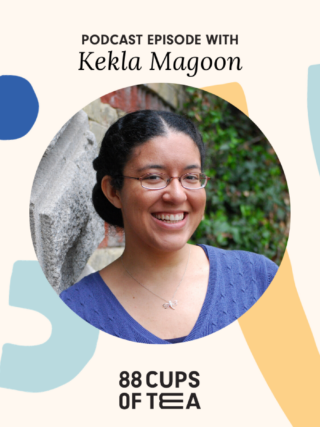88 Cups of Tea presents Essay & Podcast Series: Intimate Stories from Writers in partnership with our friends at VCFA
Signing the first book contract, and holding that debut in your hands, is not the end of the publishing journey. Along with that first success – often hard-won after many years and several trunked manuscripts – comes a pair of new challenges: keeping the momentum going and battling imposter syndrome. After all, the debut wasn’t the only book you wrote, or will ever write. And as the public now weighs in through reviews, sales, and attendance at your book events, you may worry that it’s only a matter of time before they find out you weren’t so special and talented after all.
Imposter syndrome is the belief that accomplishments are entirely the result of luck rather than ability and hard work, that success is undeserved and, for that reason, fleeting. And a highly competitive field like writing for children and teens, one in which luck and timing do play major roles, can exacerbate the feeling of being an impostor.
I too suffered from imposter syndrome through three published novels for young readers. And then the thing I most feared actually happened to me. One of my books received negative professional reviews. Another one had middling reviews and low sales. My next YA manuscript didn’t sell. Nor did the six after that, a combination of picture books, middle grade proposals, and another YA novel that took two years to write and revise. And after several years of this, I didn’t just feel like an imposter. The world was telling me so with every rejection and every editor who didn’t even respond.
I racked my brain for answers. Had I forgotten how to write? After all, I fell off a ladder while trying to stormproof my house during Hurricane Irene and sustained a concussion, an accident that was both literal and metaphorical. Or was my first novel, which did garner wide acclaim, a fluke and/or evidence of critical indulgence toward debut authors? After all, it’s not imposter syndrome if I really am an imposter.
The long sales drought has been my ultimate confrontation with imposter syndrome. But when faced with accepting the world’s judgement of me and finding something else to do with the rest of my life, I’ve chosen to embrace and address my inner imposter. I’ve chosen to improve my craft and focus more on my overall mission. I’ve done this in two ways.
The first is to use this time without contracts or deadlines to experiment with different methods of telling stories. When I was a student at Vermont College of Fine Arts, I read several novels with multiple POV or omniscient narrators. At the time, all my novels featured the ever-popular first person, present tense, and I didn’t want to stray from what had been working for me. But writing a novel with multiple POV characters who become a kind of collective protagonist has allowed me to hone my narrative skills and stretch my writing repertoire. I enjoyed the experience of writing this novel and learned from it. With a greater range, I’ve developed more confidence in my craft. And having finished and revised that manuscript – and found a new agent with it – I’ve now turned to writing a verse novel. More skills learned. I’ve begun to feel that I’m growing professionally, even without a new publishing contract yet to show for it.
The second way that I’ve confronted imposter syndrome is by looking at the larger picture of my place in the publishing industry as an autistic writer who writes both autistic and allistic protagonists. If my feeling of being an imposter led me to quit writing, it would show every other autistic writer, and every autistic reader, that we don’t belong in the industry, that we can’t break in or if we do break in, we don’t stay for long. The advice to “fake it ’til you make it,” given to those who suffer from imposter syndrome, takes on a special urgency for marginalized writers for whom the default is invisibility. My choices are not for myself alone, and my work as a writer is inseparable from my activism on behalf of a community that continues to struggle for acceptance and inclusion.
So I keep writing, trying new things, and hitting the “send” button despite imposter syndrome, the fear that I don’t truly belong in the elite league of traditionally published authors. With each new project, I see myself growing as a writer, digging deeper into my characters and themes, creating lines that sing and images that linger. All these efforts help to convince me that my time will come again. I hope my story inspires you to keep going and keep growing if you too feel trapped in the echo chamber of imposter syndrome and a long sales drought.

Lyn Miller-Lachmann is a graduate of the Writing for Children and Young Adults program at VCFA and the author of the award-winning YA historical novel Gringolandia, the own voices novel Rogue for older middle grade readers, and Surviving Santiago, a companion to Gringolandia. She is also a translator of children’s books, screenplays, and scholarly articles from Portuguese and Spanish to English. She divides her time between New York City and Lisbon, Portugal. She is represented by Jacqui Lipton at Storm Literary Agency and blogs regularly on diversity-related topics here.
Vermont College of Fine Arts is a global community of artists continuously redefining what it means to be an arts college. It is accredited by the New England Commission on Higher Education (NECHE) and offers the Master of Fine Arts degree in a variety of fields, including Writing, Writing for Children & Young Adults, and Writing & Publishing, along with an International MFA in Creative Writing & Literary Translation. With low-residency and fully residential options, VCFA has the graduate program to fit your needs. Learn more at vcfa.edu.












